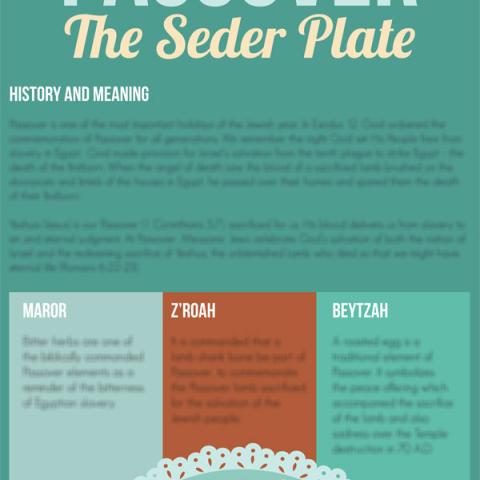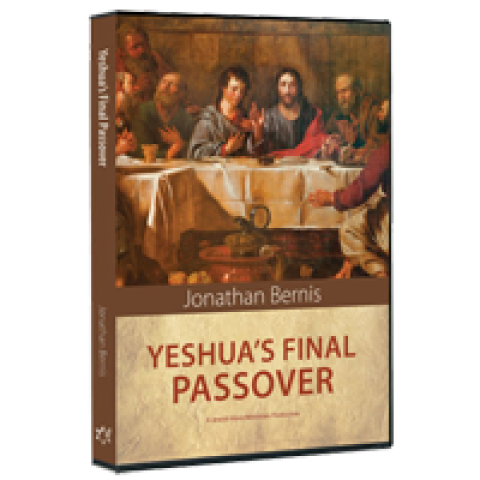
Jewish and Christian leaders, both in history and in the present day, offer considerable objection to Christian observance of the Passover. It seems that neither official Judaism nor official Christianity is very tolerant of Christians who confuse and confound the clear delineation between these two faiths by attempting to observe the traditional Passover, with or without including the Calvary experience.
Christian Concerns
Most Christian objection to Passover observance is based on ecclesiastical anti-Judaism that developed after the Church’s first century. Before the Church fully opened the door to the Gentiles at the Jerusalem Council, the vast majority of its communicants were Jews; therefore, there was no question as to whether Christians should observe Passover. Its celebration was a significant part of the biblical heritage upon which the early Jewish leaders of the Church had founded a faith and polity that recognized Yeshua (Jesus) as the fulfillment of the Messianic expectations of His people and as the Savior of the world.
As Gentiles came to prominence in the Church, they were influenced by traditions which they had brought with them and by pressures from the political powers of the day to disassociate themselves from the Jews and things “Jewish.” At the same time a controversy raged in the Church over whether complete obedience to the Law of Moses was essential to salvation in addition to faith in Jesus. Of particular concern was the practice of circumcision, whether it should be physically enforced on new converts to this Judeo-Christianity or whether the circumcision of the heart that God had described to Moses, Jeremiah, and Paul was sufficient without the physical procedure.
Get the Passover Infographic
This enlightening infographic will teach you the meaning of the Passover seder plate, the elements to include and the significance behind them.
In some of Paul’s writings, he openly attacked that part of the Jewish community (both in traditional Judaism and in the Church) that believed salvation resulted from submission to and ritual observance of God’s law. This social criticism, an intramural exercise among fellow Jews, was misunderstood and generalized by later Gentile Church leaders.
Rather than maintain Paul’s balanced position on the interrelationship of Christian faith and the Law, subsequent Church leaders adopted an increasingly antinomian posture, ultimately insisting that Christians have nothing in common with Jews and Judaism. This was particularly true in relationship to ecclesiastical holy days which had been changed from their original First-Century construct to accommodate the various societies into which the Christian faith had expanded. Passages such as Colossians 2:16-17 were enlisted to assure Christians that all “Jewish” holy days and Sabbaths had been abandoned by the Church.
Additionally, virtually all of the Christian Church, including the reform movements that began in the sixteenth century and afterward, maintained a supercessionist view toward Jews and Judaism, which asserted that Christianity had forever replaced Judaism in God’s economy of salvation and that Christians had forever replaced the Jewish people, who had been cursed because of their rejection of Jesus.
Get Yeshua's Final Passover DVD
In this inspirational DVD, filmed on location in Jerusalem in the Upper Room, Rabbi Jonathan Bernis teaches us how to observe the rich traditions of the Passover Seder — just as Yeshua (Jesus) did with His disciples over 2,000 years ago, known as the Last Supper.
Having been ripped from its moorings, Christianity drifted on the tide of human tradition, often swirling in the maelstrom of a pagan-based world view that allowed violent conduct toward the Jewish people. In this kind of environment, it was unthinkable that a Christian would celebrate a “Jewish” festival, including the Passover. Even today, in an age of enlightenment, much of the Church is wary of any involvement in “Jewish” practices.
Growing numbers of Christians, however, are rejecting these historical arguments and are rediscovering Christianity’s Jewish connection. They are saying to themselves, “If it was right for Jesus and the apostles, it must be right for me.” They are embracing teachings and practices that were clearly a part of the First Century Church’s system of praise, worship, and service. And, they are discovering rewarding and fulfilling experiences as they immerse themselves in this clearly biblical and “New Testament” heritage.
Christian Passover: A Jewish Interpretation
Both Jews and Christians need to recognize the fact that Christian understanding of prophecies and practices in the Hebrew Scriptures rests on interpretations of those Scriptures by Jews of the First Century who came to see Jesus of Nazareth as the Messiah of Israel. Jesus Himself was a Torah-observant Jew. All of the apostles on whom the Church was built were Torah-observant Jews. Virtually the entire constituency of the Church’s first decade were Jews who were faithful to the Law. Indeed, many of their number were and continued to be Pharisees (Acts 15:5) and Temple priests. (Acts 6:7) As Jews, they had a clear and distinct right to interpret their Scriptures apart from any overarching dogma or systematic theology imposed upon them by another part of the traditional Jewish community, for no one branch of Judaism was dominant at that time.
Get the Passover Infographic
This enlightening infographic will teach you the meaning of the Passover seder plate, the elements to include and the significance behind them.
Christian interpretations of the Passover and its manifestation in the death and resurrection of Jesus are established on the solid rock of Jewish interpretation. These Jewish followers of Jesus celebrated the Passover Seder traditions of their day, imbuing each part with additional meaning from the life, death, resurrection, and ascension of Jesus. When the early Jewish leaders of the Christian Church interpreted the Passover events allegorically as pointing to Jesus, they did so on the basis of Jewish hermeneutics. Later Gentile Christians’ allegorical interpretations of the Exodus Passover events merely expanded upon the foundation that their Jewish predecessors had laid. These ideas, then, were birthed in the fertile hearts of observant Jews: Jesus and His Apostles. They are, therefore, Jewish interpretations, not Gentile interpolations that can be casually dismissed as lacking authenticity.
Naturalized Citizens
One of the key concepts that was advanced when the Jewish founders of the Christian Church purposed to open the door of faith to the Gentiles was that this action was also a fulfillment of the Hebrew Scriptures, which had predicted that Israel’s light would be carried to the Nations of the world. (Isaiah 42:6; 49:6; cf. Luke 2:32; Acts 13:47) It was also a cardinal principle that all those Gentiles who were added to the Church were, in effect, added to the Commonwealth of Israel (Ephesians 2:12-16) or the Tabernacle of David (Acts 15:15), albeit on the basis of less restrictive initiation requirements.
The bottom line is that all the Gentiles who came to faith in Jesus were considered by their Jewish brethren to have been grafted into God’s family tree of salvation and Covenant relationship (the theme of Romans 11). They were also considered to have become naturalized citizens in the Commonwealth or Nation of Israel, a teaching clearly set forth in Ephesians 2. They were “no more strangers and foreigners” but “fellow citizens with the saints and of the same body.” Even in ancient Israel, a proselyte was to be considered as though he had been born to Jewish parents.
Get Yeshua's Final Passover DVD
In this inspirational DVD, filmed on location in Jerusalem in the Upper Room, Rabbi Jonathan Bernis teaches us how to observe the rich traditions of the Passover Seder — just as Yeshua (Jesus) did with His disciples over 2,000 years ago, known as the Last Supper.
Paul made this clear in 1 Corinthians 10:1 when, writing specifically to Gentile Christians, he declared: “For I do not want you to be ignorant of the fact, brothers, that our forefathers were all under the cloud and that they all passed through the sea.” Coupled with his declaration to Gentile believers in Romans 4:12, 16 that Abraham is “the father of us all [Jew and Gentile],” it is clear that the apostle considered the Gentiles who had come to faith in the Messiah to be children of the patriarch, Abraham.
With this in mind, it is only natural that there is a longing in the heart of Christians to rediscover the roots of their faith, to find their way back home. Clearly Gentiles by birth, they have been added to the Nation of Israel by faith in Jesus. As fellow citizens with the saints of Israel, they are entitled to the entire heritage of God’s chosen people. If one immigrates into a nation of the modern world, he can either remain a foreigner or he can go through the process of naturalization. In the United States when one takes the Oath of Allegiance, he is as much a citizen as the person whose ancestors signed the Declaration of Independence, and he has the same rights. Virtually every other nation has just such a memorial day for its statehood in which naturalized citizens share equally with the native-born.
Passover is the yearly memorial of the liberation of Israel, the event that set them on the path toward Sinai and their incorporation as God’s Chosen Nation of Priests. It is foundational to Judaism, but it is also foundational to Christianity, for if there had been no Passover, there would have been no nation of Israel to have produced Jesus, nor would there have been a Nation of Israel into whom Gentile Believers could be added as naturalized citizens.
To Celebrate or Not to Celebrate
Should Christians celebrate Passover? This is a legitimate question to which much of the Church and most of Judaism have said no. But the answer for believers must be what is given in Holy Scripture.
Should Christians celebrate Passover? When we remain faithful to the Bible, the answer is clear and unequivocal: “Because Christ our Passover has been sacrificed for us; therefore, let us observe the festival [Passover and Unleavened Bread] ... with the unleavened bread of sincerity and truth” (1 Cor. 5:7-8). This directive is from a Christian apostle who even then was still a Jewish rabbi, and it was given to Gentiles. What could possibly be more apparent?
Get the Biblical Feast Tent Cards
Discover the significance of Jewish feasts with these beautifully designed table-top tent cards.
The next question is, How should Christians observe the Passover? Again, the Bible gives a clear answer. What better example could we have than that of our Lord Jesus Himself? According to the Gospels, He celebrated the Passover with His Disciples in the traditional Seder that the sages had prescribed for His time. The core of the modern Seder predates the time of Yeshua and was the order which He employed in the Last Supper. Christians are free to imitate Jesus’ way of life at any time; however, they are bound to no specific ritual for their salvation. Freedom in the Messiah permits great flexibility of practice.
Should any remain confused, Paul gives the liturgical order for recognizing Yeshua’s sacrificial death in the Passover celebration: “For I received from the Lord that which I also delivered to you: that the Lord Jesus on the same night in which He was betrayed took bread; and when He had given thanks, He broke it and said, ‘Take, eat; this is My body which is given to you; do this in remembrance of Me.’ In the same manner He also took the cup after supper, saying, ‘This cup is the New Covenant in My blood. This do, as often as you drink it, in remembrance of Me.’ For as often as you eat this bread and drink this cup, you proclaim the Lord’s death till He comes.” (1 Cor. 11:23-26)
Passover? Celebrate!
This article is excerpted from the book, Christian Celebrations for Passover, by Dr. John D. Garr. used by permission. All rights reserved.
Dr. John D. Garr has pioneered research, writing, and teaching on the Hebrew Foundations of Christian Faith for more than thirty years. His international ministry has enlightened believers of various communions, teaching them the historical and theological emergence of Christianity from the matrix of biblical Judaism. John and his wife, Pat, with the support of their sons, John, Timothy, and Stephen, work to promote the Restoration Foundation and Hebraic Heritage Christian School of Theology.







